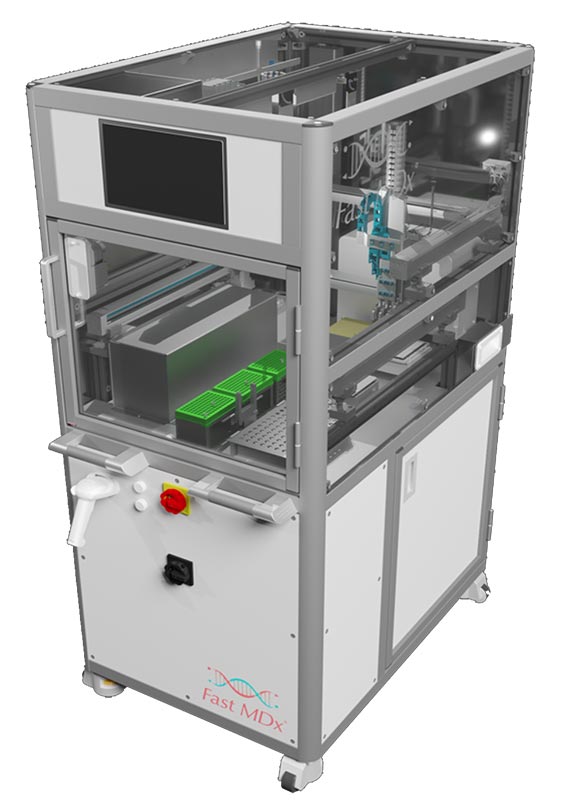World’s First Low-Cost, High-Throughput, Near-Patient Molecular Diagnostic Test System Dramatically Reduces Wait Times
|
By HospiMedica International staff writers Posted on 27 Feb 2024 |

It is important for doctors to rapidly and accurately identify prevalent respiratory pathogens like COVID-19, influenza A and B, RSV-A, and RSV-B for administering prompt, tailored treatment to infected individuals. In a significant advancement, a near-patient test system using automation technology detects pathogens with unrivaled speed and cuts the typical waiting time of 24 to 48 hours to just one to two hours without the need for expensive biosafe laboratories.
Fast MDx Limited (Middlesex, UK) and Festo (London, UK) have jointly designed and developed the world’s first, low-cost, high-throughput, near-patient molecular diagnostic test system that will provide clinicians with earlier, more informed results, allowing each patient to receive a faster, personalized clinical pathway. The Fast MDx system comprises everything necessary for testing, including sample tubes, swabs, and even electronic result transmission to the originating hospital, clinic, or doctor’s office. The system incorporates Fast MDx’s latest, ultra-fast, NGx2 4-Channel qPCR thermal cycler and Reverse Transcription block technology. The Fast MDx platform aspirates the sample through the cap of Fast MDx’s patented Pathtubes and so requires no manual sample handling or preparation steps. The Fast MDx platform employs Festo’s automation technology for precise pipetting and dispensing, streamlining the testing process. This saves considerable time for technicians and minimizes the potential for human error in manual pipetting tasks.
The platform is fully automated, portable, and requires just one technician for operation, in contrast to the usual five needed in a central lab to process up to 1,000 samples in an 8-hour shift. Designed for ease of mobility, the system can traverse standard doorways and elevators, resting on four sturdy, lockable casters. Its near-patient functionality allows it to be deployed in diverse settings such as test centers, hospitals, or pathology labs. Equipped with advanced cybersecurity features, Fast MDx integrates seamlessly with major Laboratory Information Management Systems (LIMS). Fast MDx will launch in early 2024 and will perform high-throughput, syndromic, respiratory testing for flu A, flu B, RSV A, RSV B, and COVID-19. Future additions to the test menu include healthcare acquired infections (HAI) such as testing for central line-associated bloodstream infections (CLABSIs), catheter-associated urinary tract infections (CAUTI), surgical site infections (SSI), and ventilator-associated pneumonia (VAP).

Latest Point of Care News
Channels
Critical Care
view channel
Ingestible Smart Capsule for Chemical Sensing in the Gut Moves Closer to Market
Intestinal gases are associated with several health conditions, including colon cancer, irritable bowel syndrome, and inflammatory bowel disease, and they have the potential to serve as crucial biomarkers... Read moreNovel Cannula Delivery System Enables Targeted Delivery of Imaging Agents and Drugs
Multiphoton microscopy has become an invaluable tool in neuroscience, allowing researchers to observe brain activity in real time with high-resolution imaging. A crucial aspect of many multiphoton microscopy... Read more
Novel Intrabronchial Method Delivers Cell Therapies in Critically Ill Patients on External Lung Support
Until now, administering cell therapies to patients on extracorporeal membrane oxygenation (ECMO)—a life-support system typically used for severe lung failure—has been nearly impossible.... Read moreSurgical Techniques
view channel
Pioneering Sutureless Coronary Bypass Technology to Eliminate Open-Chest Procedures
In patients with coronary artery disease, certain blood vessels may be narrowed or blocked, requiring a stent or a bypass (also known as diversion) to restore blood flow to the heart. Bypass surgeries... Read more
Intravascular Imaging for Guiding Stent Implantation Ensures Safer Stenting Procedures
Patients diagnosed with coronary artery disease, which is caused by plaque accumulation within the arteries leading to chest pain, shortness of breath, and potential heart attacks, frequently undergo percutaneous... Read more
World's First AI Surgical Guidance Platform Allows Surgeons to Measure Success in Real-Time
Surgeons have always faced challenges in measuring their progress toward surgical goals during procedures. Traditionally, obtaining measurements required stepping out of the sterile environment to perform... Read morePatient Care
view channel
Portable Biosensor Platform to Reduce Hospital-Acquired Infections
Approximately 4 million patients in the European Union acquire healthcare-associated infections (HAIs) or nosocomial infections each year, with around 37,000 deaths directly resulting from these infections,... Read moreFirst-Of-Its-Kind Portable Germicidal Light Technology Disinfects High-Touch Clinical Surfaces in Seconds
Reducing healthcare-acquired infections (HAIs) remains a pressing issue within global healthcare systems. In the United States alone, 1.7 million patients contract HAIs annually, leading to approximately... Read more
Surgical Capacity Optimization Solution Helps Hospitals Boost OR Utilization
An innovative solution has the capability to transform surgical capacity utilization by targeting the root cause of surgical block time inefficiencies. Fujitsu Limited’s (Tokyo, Japan) Surgical Capacity... Read more
Game-Changing Innovation in Surgical Instrument Sterilization Significantly Improves OR Throughput
A groundbreaking innovation enables hospitals to significantly improve instrument processing time and throughput in operating rooms (ORs) and sterile processing departments. Turbett Surgical, Inc.... Read moreHealth IT
view channel
Printable Molecule-Selective Nanoparticles Enable Mass Production of Wearable Biosensors
The future of medicine is likely to focus on the personalization of healthcare—understanding exactly what an individual requires and delivering the appropriate combination of nutrients, metabolites, and... Read more
Smartwatches Could Detect Congestive Heart Failure
Diagnosing congestive heart failure (CHF) typically requires expensive and time-consuming imaging techniques like echocardiography, also known as cardiac ultrasound. Previously, detecting CHF by analyzing... Read moreBusiness
view channel
Expanded Collaboration to Transform OR Technology Through AI and Automation
The expansion of an existing collaboration between three leading companies aims to develop artificial intelligence (AI)-driven solutions for smart operating rooms with sophisticated monitoring and automation.... Read more
















